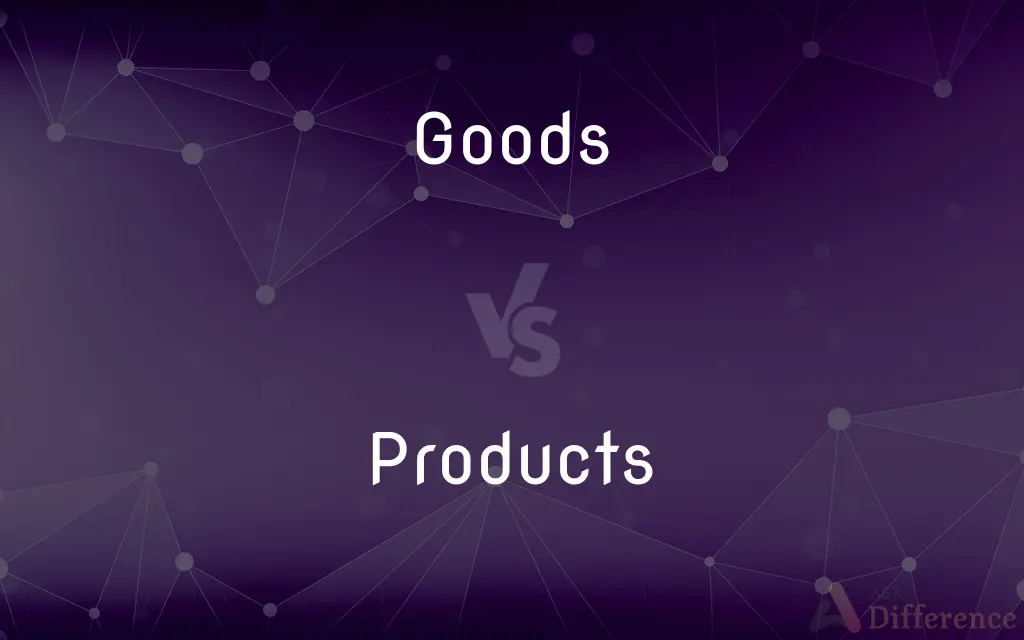Goods vs. Products — What's the Difference?
By Tayyaba Rehman — Published on November 2, 2023
Goods refer to tangible, physical items that satisfy human wants, while products can encompass both tangible and intangible items (including services) designed for market offerings.

Difference Between Goods and Products
Table of Contents
ADVERTISEMENT
Key Differences
Goods, in an economic and commercial sense, imply tangible commodities - items that possess physical form. Products, while embracing all that goods embody, venture further into intangibles, enveloping services, strategies, and reputations. Both words, though closely related, navigate through the spectrum of market offerings with nuanced distinctions.
Delving into goods, we speak of items like apparel, machinery, or groceries - entities you can touch and move. Conversely, products might reference a broadened scope, embracing not only physical items but also experiences, events, persons, and even ideas, thus encompassing a spectrum wider than goods.
From a retail perspective, goods stand as the items that are manufactured, stored, transported, and sold, sustaining the tangible aspect throughout their lifecycle. On the other hand, products might never manifest tangibility, exemplified by insurance policies, consultancy services, or digital products, converging on user satisfaction without physicality.
Goods often traverse through trade channels, becoming subject to import, export, and tariffs due to their physical nature. Products may bypass many traditional trade hurdles, particularly those of an intangible nature, like software or digital marketing services, making their market proliferation less geographically constrained.
In marketing, goods are often the tangible output around which strategies pivot, necessitating physical logistics and storage. Products demand a more holistic strategy, where even goods become encapsulated in a broader narrative that includes after-sale service, brand perception, and customer engagement, demonstrating an inclusive approach beyond mere physicality.
ADVERTISEMENT
Comparison Chart
Tangibility
Always tangible
Can be tangible or intangible
Nature
Physical items only
Encompasses items, services, experiences
Trade Restrictions
Subject to more trade restrictions
May have fewer trade restrictions
Marketing Approach
Primarily focused on physical attributes
Encompasses broader marketing strategies
Example Types
Apparel, groceries, machinery
Software, consultancy, apparel
Compare with Definitions
Goods
Goods entail physical items that are produced to be sold.
The country exports goods such as coffee and spices.
Products
Products encompass tangible items and intangible services offered to a market.
The company’s products range from physical devices to maintenance services.
Goods
Goods can be classified into durable and non-durable types.
The furniture shop specializes in durable goods designed to last.
Products
Products may convey a brand and its associated values.
Apple’s products are often associated with innovation and quality.
Goods
Goods are often subject to taxes and tariffs in international trade.
Importers pay tariffs on goods received from other countries.
Products
Products can be physical, digital, or based on providing service.
Streaming platforms offer digital products to entertainment seekers.
Goods
Being positive or desirable in nature; not bad or poor
A good experience.
Good news from the hospital.
Products
Products involve a creation process, which may or may not be physical.
Insurance firms develop products to meet varied customer requirements.
Goods
Having the qualities that are desirable or distinguishing in a particular thing
A good exterior paint.
A good joke.
Products
Products could be strategically designed experiences or events.
Theme parks sell products in the form of unique and memorable experiences.
Goods
Serving the desired purpose or end; suitable
Is this a good dress for the party?.
Products
An item that is made or refined and marketed
Farm products.
Soaps, detergents, and similar products.
Travel products such as vacation trips.
Goods
Not spoiled or ruined
The milk is still good.
Products
Such items considered as a group
Sold a lot of product in May.
Goods
In excellent condition; sound
A good tooth.
Products
A preparation, such as a gel, used for styling hair
Began to use product soon after he became famous.
Goods
Superior to the average; satisfactory
A good student.
Products
A substance resulting from a chemical or nuclear reaction.
Goods
Used formerly to refer to the US Government grade of meat higher than standard and lower than choice.
Products
A direct result; a consequence
"Is history the product of impersonal social and economic forces?" (Anthony Lewis).
Goods
Of high quality
Good books.
Products
A person whose characteristics or abilities are the result of certain influences or kinds of experience
"She is the product of an America in which explicit displays of pride in intellect are considered unseemly" (Yuval Levin).
Goods
Discriminating
Good taste.
Products
The number or quantity obtained by multiplying two or more numbers together.
Goods
Of moral excellence; upright
A good person.
Products
A scalar product.
Goods
Benevolent; kind
A good soul.
A good heart.
Products
A vector product.
Goods
Loyal; staunch
A good Republican.
Products
Plural of product
Goods
Well-behaved; obedient
A good child.
Goods
Socially correct; proper
Good manners.
Goods
Worthy of respect; honorable
Ruined the family's good name.
Goods
Attractive; handsome
Good looks.
Goods
Beneficial to health; salutary
A good night's rest.
Goods
Competent; skilled
A good machinist.
Goods
Complete; thorough
A good workout.
Goods
Reliable; sure
A good investment.
Goods
Valid or true
A good reason.
Goods
Genuine; real
A good dollar bill.
Goods
In effect; operative
A warranty good for two years.
A driver's license that is still good.
Goods
Ready or able for a specified or assumed activity
I'm good for another round of golf.
Goods
Able to pay or contribute
Is she good for the money that you lent her?.
Goods
Able to elicit a specified reaction
He is always good for a laugh.
Goods
Ample; substantial
A good income.
Goods
Bountiful
A good table.
Goods
Full
It is a good mile from here.
Goods
Pleasant; enjoyable
Had a good time at the party.
Goods
Propitious; favorable
Good weather.
A good omen.
Goods
Landing within bounds or within a particular area of a court and therefore in play
The first serve was wide, but the second was good.
Goods
Passing between the uprights of the goal and therefore scoring, as a field goal in football.
Goods
Used to form exclamatory phrases expressing surprise or dismay
Good heavens! Good grief!.
Goods
Something that is good.
Goods
A good, valuable, or useful part or aspect.
Goods
Welfare; benefit
For the common good.
Goods
Goodness; virtue
There is much good to be found in people.
Goods
A product that is bought and sold
Frozen goods.
Goods
Goods Portable personal property.
Goods
(used with a sing. or pl. verb) Fabric; material.
Goods
Goods(Slang) Incriminating information or evidence
Tried to get the goods on the crook.
Goods
Well.
Goods
Plural of good
Goods
That which is produced, then traded, bought or sold, then finally consumed.
Goods
Freight, as opposed to passengers.
Goods
Something authentic, important, or revealing.
Goods
(slang) The female body, especially when seen as desirable.
Goods
(slang) The male genitals.
Goods
Articles of commerce
Goods
Goods are tangible commodities available for purchase.
The store offers a wide variety of goods, from clothing to electronics.
Goods
Goods, in economic terms, provide utility and satisfy wants.
Consumers buy goods to fulfill their needs and desires.
Common Curiosities
How does the term 'Products' extend beyond 'Goods'?
'Products' encompass both tangible items (goods) and intangible offerings like services or digital solutions.
What defines 'Goods' in a general context?
'Goods' typically refer to tangible items that are produced and consumed.
Why do businesses distinguish between 'Goods' and 'Products' in their offerings?
This distinction helps in creating targeted marketing and operational strategies, considering the nuances of selling tangible vs. intangible offerings.
Can a single brand offer both 'Goods' and 'Products'?
Yes, a brand might offer tangible items (goods) and intangible offerings (products) like services, digital solutions, or experiences.
Can 'Goods' also include services?
No, 'Goods' specifically refer to tangible, physical items, while services fall under the broader term 'Products'.
Are digital solutions considered 'Goods' or 'Products'?
Digital solutions are considered 'Products' since they fall into the intangible category.
How does international trade differ for 'Goods' and intangible 'Products'?
'Goods' often involve complex logistics and are subject to tariffs, whereas intangible 'Products' usually face fewer trade barriers and different regulatory considerations.
How is the pricing of 'Goods' different from 'Products'?
Pricing for 'Goods' typically considers manufacturing costs, while 'Products' pricing might also factor in aspects like service delivery, brand value, and user experience.
In economic downturns, do 'Goods' and 'Products' typically see similar trends in demand?
Not necessarily. The demand for 'Goods' and 'Products' during economic downturns can vary based on factors like consumer needs, essentiality, and disposable income.
Can intangible 'Products' become more dominant in a market than tangible 'Goods'?
Yes, in many modern markets, especially tech and finance, intangible 'Products' like apps or consulting services may outweigh physical 'Goods' in demand and revenue.
How do marketing strategies for 'Goods' differ from 'Products'?
'Goods' marketing often emphasizes physical attributes, while 'Products' marketing might also underscore experiences, solutions, and benefits of intangible elements.
How does product life cycle management differ between 'Goods' and 'Products'?
For 'Goods', focus might be on manufacturing, logistics, and inventory, while for 'Products', emphasis may also be on service delivery, customer experience, and ongoing support.
Can a product be both a good and a service?
Yes, some 'Products' combine goods and services, offering a tangible item along with an intangible service element, enhancing value.
Are 'Goods' always physical items?
Yes, 'Goods' are always tangible, physical items that can be seen and touched.
What are some challenges unique to selling 'Goods' compared to 'Products'?
Challenges for 'Goods' might include logistics, storage, and tangible quality assurance, while 'Products' could present challenges in communicating intangible value and ensuring service quality.
Share Your Discovery

Previous Comparison
Hazara vs. Pashtun
Next Comparison
Carbon Steel vs. Black SteelAuthor Spotlight
Written by
Tayyaba RehmanTayyaba Rehman is a distinguished writer, currently serving as a primary contributor to askdifference.com. As a researcher in semantics and etymology, Tayyaba's passion for the complexity of languages and their distinctions has found a perfect home on the platform. Tayyaba delves into the intricacies of language, distinguishing between commonly confused words and phrases, thereby providing clarity for readers worldwide.
















































